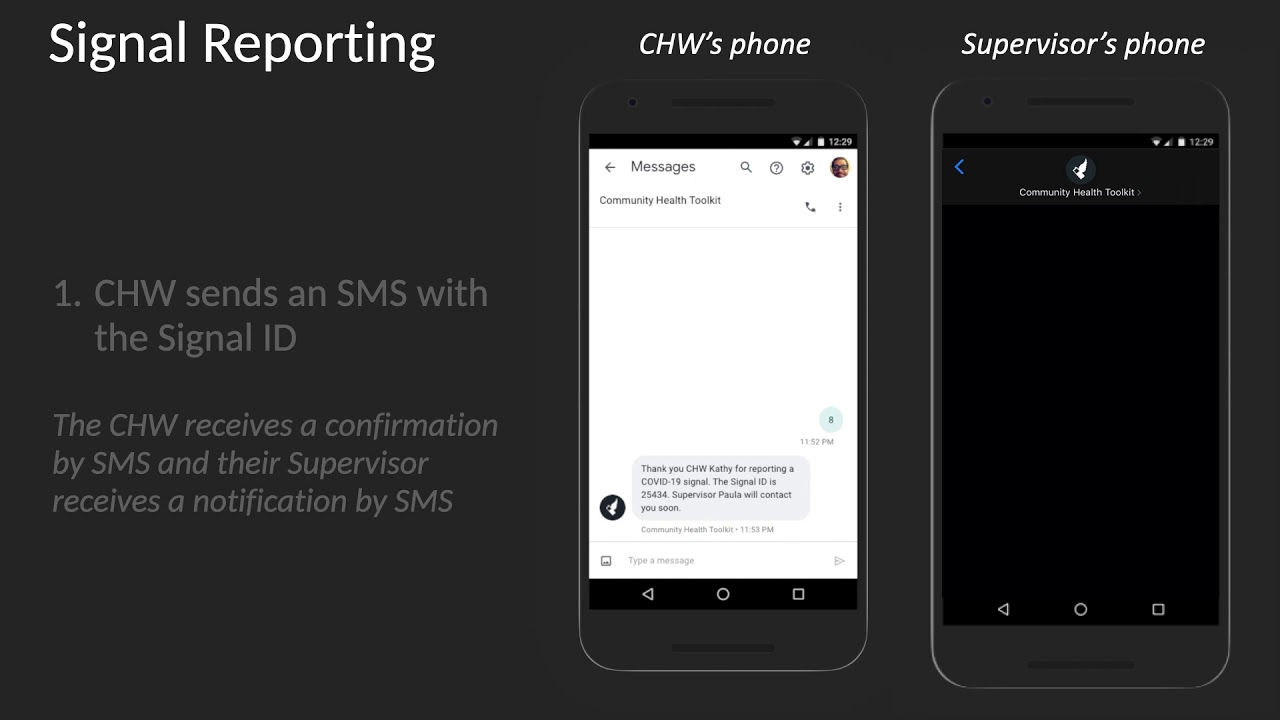Over the past few weeks, the Medic Mobile team built a reference version of a COVID-19 Event-Based Surveillance App for use by Community Health Workers, CHW supervisors, and MoH Investigators.
The current version of this reference application is based off of design work the Medic Mobile team has done with the Ministry of Health in Kenya, CDC, KEMRI, and HJFMRI to develop and deploy a community-level, event-based surveillance system in two counties. The system was the first of its kind in Kenya and it is ready for reuse and scale in Kenya and countries with similar requirements to respond to COVID-19.
CHT System Features
This is a simple workflow that enables CHWs to use SMS to report signal codes for specific health threats to their supervisors for verification, which are then escalated to the sub-county for investigation and follow-up. This CHT reference application is designed to be flexible in nature and there is the potential to combine EBS with other CHT COVID-19 workflows, including, for example, Contact Tracing or COVID Self-Checks.
- No hardware costs, by leveraging personal devices in the hands of the CHWs, CHW supervisors and sub-county teams, as well as facility or county-owned computers/laptops
- Free-to-end-user interaction with centralized SMS billing and an existing short-code
- Simple and user-friendly SMS and mobile application design
- Scalable platform which can be sustained as a national platform in the future
- Built-in escalation mechanism to ensure timely response
Our application enables real-time reporting and visualization at multiple levels of the health system to inform decision-making related to COVID, including HRH and PPE allocation, planning for isolation centers, and adapting PHC protocols to maintain care.
Time-Sensitive Opportunity
For many countries around the world, now is the time to be planning early detection and surveillance interventions to try to mitigate the impact of COVID-19 through proactive identification and treatment of patients before the size of the case counts is too high to do so.
For partners interested in deploying Event-Based Surveillance using the CHT, we want to share some insights on this opportunity:
- Medic Mobile will support training for all CHWs, Supervisors, and Health Admins on COVID-19 signals and reporting procedures
- Additionally, Medic Mobile is working on building workflows on the CHT core framework to train CHWs remotely through a series of SMS instructions on the case definition, reporting role, and reporting process, as well as associated videos and images
- This app enables monitoring for COVID-19 signals via a signal ID sent to the MOH shortcode
- EBS allows for collaboration with existing partners with district-level coverage
- We focus on COVID-19 signal reporting now and can add additional signals codes later
- Our goal is to achieve the earliest possible detection of cases to minimize local transmission
- The hope is to achieve visibility into signals, reports, and investigations centrally
For more information on this COVID CHT use case, please refer to our CHT EBS documentation resource.
We’d love to hear from the members of our community. What do you think about Event-Based Surveillance in the community? What feedback or questions do you have for the team at Medic Mobile? We look forward to discussing this with you here!
